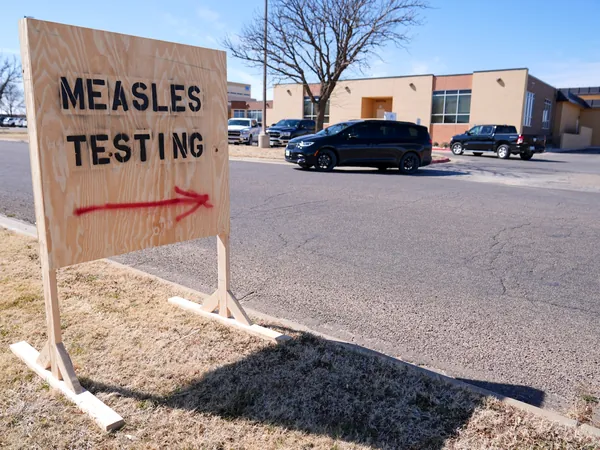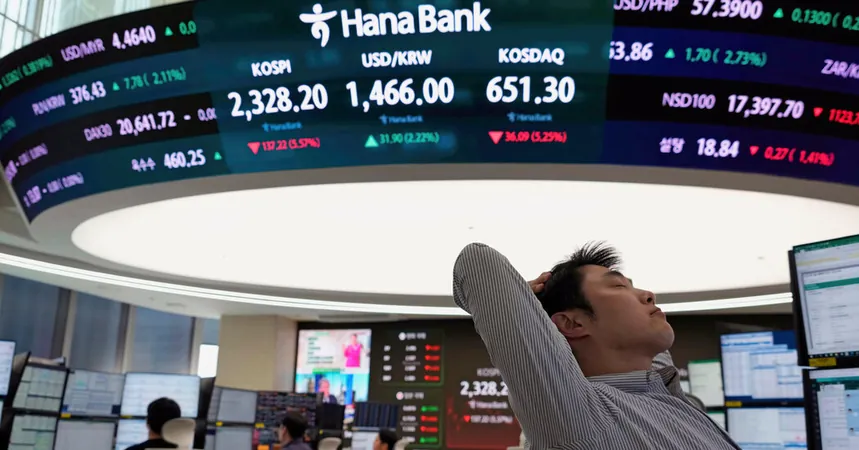
Texas Health Workers Battle Measles Outbreak Amidst Surge of Misinformation
2025-03-31
Author: Lok
Dallas, Texas – The ongoing fight against misinformation in healthcare has come to the forefront as Texas faces a rising measles outbreak. Therissa Grefsrud, a specialized infection prevention nurse, recalls handling vaccine-related inquiries during the COVID-19 pandemic. One woman expressed fears that vaccines could affect her fertility, prompting a conversation grounded in facts that ultimately led the woman to vaccination.
Fast forward to today, Grefsrud and her colleagues are now confronted with a measles outbreak that has grown alarming. The United States Centers for Disease Control and Prevention (CDC) categorize measles as one of the most contagious diseases, with up to 90% transmission rates among unvaccinated individuals. Unfortunately, over 400 cases have been confirmed in Texas from January to March of this year, surpassing the total of 285 cases nationwide reported throughout 2024.
This resurgence of measles has resulted in over 40 hospitalizations, and tragically, the first measles-related death in a decade occurred in a school-aged child from Lubbock. Experts are concerned about potential spillover effects, with reports of additional cases surfacing in neighboring New Mexico.
Vaccine hesitancy, fueled by rampant misinformation, has made public health efforts difficult. Dr. Jennifer Nuzzo of Brown University’s Pandemic Center describes the current situation as an "utter tragedy," noting that measles was declared eliminated in the US just 25 years ago due to successful vaccination campaigns.
Amid the public health crisis, some officials, including Health and Human Services Secretary Robert F. Kennedy Jr., have downplayed the role of vaccination in protecting against measles. Kennedy's controversial statements have included claims of side effects from the vaccine and a misguided promotion of vitamin A supplements, despite the overwhelming evidence of vaccine safety and effectiveness.
The Texas outbreak coincides with a troubling trend of anti-vaccine legislation. In 2003, Texas passed an amendment allowing for vaccine exemptions on "reasons of conscience," leading to a significant increase in vaccine exemptions within the state. Legislative proposals abound that would further ease restrictions on vaccine opt-outs, reflecting growing skepticism surrounding vaccinations.
Public health officials, including Dallas Health and Human Services Director Dr. Philip Huang, advocate for empathetic communication strategies to engage the public and combat misinformation. Effective outreach focuses on leveraging trusted community figures to address concerns and provide factual information.
The presence of a well-established anti-vaccine narrative, exacerbated by the COVID-19 pandemic, has made the climate for accurate health communication increasingly challenging. Rekha Lakshmanan, chief strategic officer for The Immunization Partnership, emphasizes the need for healthcare professionals to adopt empathetic approaches when discussing vaccine hesitancy, understanding that many parents are navigating a complex landscape of misinformation.
Researchers have noted a surge in demand for measles vaccinations in Texas following the outbreaks, suggesting that individuals may be responding to the public health threat by seeking vaccinations.
Amid the political turmoil surrounding vaccine messaging and health policies, experts warn of the strong likelihood of ongoing challenges against measles. With the potential for long-lasting consequences for public health, the U.S. risks losing hard-won disease control advancements if complacency continues.
As we navigate through this crisis, the importance of understanding and combatting misinformation remains crucial in protecting public health and ensuring community members can make informed health decisions. The fight against measles isn't just about disease prevention; it encapsulates a broader battle against the tide of misinformation that endangers lives.


 Brasil (PT)
Brasil (PT)
 Canada (EN)
Canada (EN)
 Chile (ES)
Chile (ES)
 Česko (CS)
Česko (CS)
 대한민국 (KO)
대한민국 (KO)
 España (ES)
España (ES)
 France (FR)
France (FR)
 Hong Kong (EN)
Hong Kong (EN)
 Italia (IT)
Italia (IT)
 日本 (JA)
日本 (JA)
 Magyarország (HU)
Magyarország (HU)
 Norge (NO)
Norge (NO)
 Polska (PL)
Polska (PL)
 Schweiz (DE)
Schweiz (DE)
 Singapore (EN)
Singapore (EN)
 Sverige (SV)
Sverige (SV)
 Suomi (FI)
Suomi (FI)
 Türkiye (TR)
Türkiye (TR)
 الإمارات العربية المتحدة (AR)
الإمارات العربية المتحدة (AR)